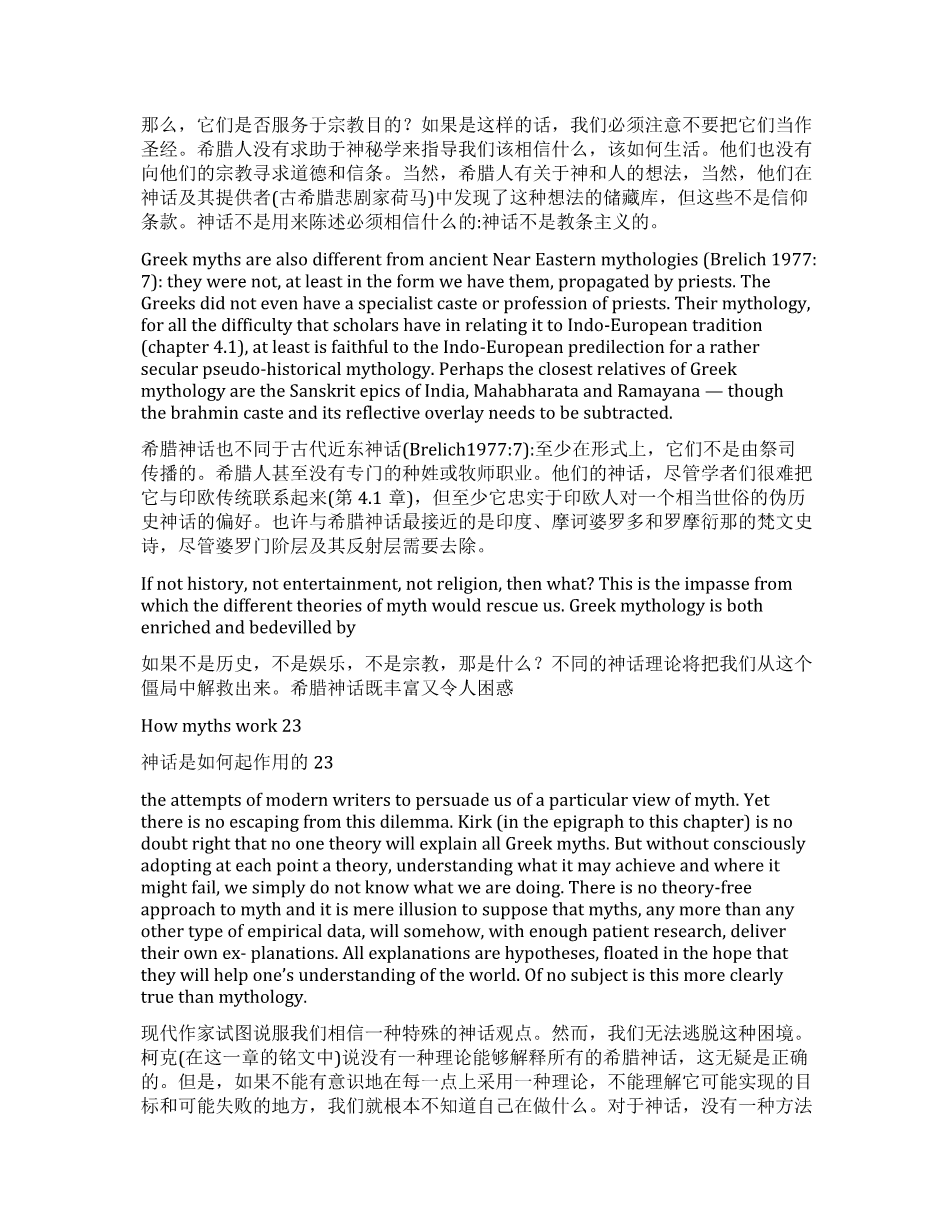从文本到影像:希腊神话在单机游戏中的应用外文翻译资料
2022-11-12 19:54:14
CS
The Uses of Greek Mythology
Ken Dowden
R
ondon and New York
3907 LINO
CS Chapter 2 How myths work: the theories
All universal theories of myth are automatically wrong. (Kirk 1977: 293) The Nemesis of disproportion seems to haunt all new
discoveries. (Max Miiller 1873: 252)
What are Greek myths for? Not to tell history, only to masquerade as history. Not just to entertain: they have too much cultural significance for that.
Do they, then, serve a religious purpose? If so, we must beware of thinking of them as scriptures. Greeks did not turn to mythol- ogy for guidance on what to believe and how to live. They did not turn to their religion for morals and creeds, either. Of course the Greeks had ideas about the gods and man, and of course they found a reservoir of such ideas in myth and its purveyors (Homer, the tragedians), but these were not articles of faith. Myth is not there to state what must be believed: myth is not dogmatic.
Greek myths are also different from ancient Near Eastern mythologies (Brelich 1977: 7): they were not, at least in the form we have them, propagated by priests. The Greeks did not even have a specialist caste or profession of priests. Their mythology, for all the difficulty that scholars have in relating it to Indo-European tradition (chapter 4.1), at least is faithful to the Indo-European predilection for a rather secular pseudo-historical mythology. Perhaps the closest relatives of Greek mythology are the Sanskrit epics of India, Mahabharata and Ramayana — though the brahmin caste and its reflective overlay needs to be subtracted.
If not history, not entertainment, not religion, then what? This is the impasse from which the different theories of myth would rescue us. Greek mythology is both enriched and bedevilled by
How myths work 23
the attempts of modern writers to persuade us of a particular view of myth. Yet there is no escaping from this dilemma. Kirk (in the epigraph to this chapter) is no doubt right that no one theory will explain all Greek myths. But without consciously adopting at each point a theory, understanding what it may achieve and where it might fail, we simply do not know what we are doing. There is no theory-free approach to myth and it is mere illusion to suppose that myths, any more than any other type of empirical data, will somehow, with enough patient research, deliver their own ex- planations. All explanations are hypotheses, floated in the hope that they will help onersquo;s understanding of the world. Of no subject is this more clearly true than mythology.
A book on changing approaches to Greek mythology should be written. But this is not it. Instead, this chapter offers a very brief review of some styles of explanation that have been tried. I hope it catches the flavour of sometimes complicated ideas.
2.1 OLD APPROACHES
Historicism
On this view, myth is actually history, merely damaged and distorted by the passage of time. It is not so much a theory as a mistake to which beginners and those who make only occasional use of myth as evidence are very susceptible. It is also the pre- dominant ancient Greek view, as we shall see in chapter 3. This view is seen quite often in discussions of tribal migrations, where prehistorians frequently mistake the ways in which myth works, supposing it to speak more directly than generally it does.rsquo; I givea few examples below:
1 Danaos (Ap 2.1.4) can be viewed simply as an historical person who really came from Egypt. But one can be more sophisticated without escaping the historicist fallacy. The myth can be thought to tell of the wanderings of the Danaoi tribe actually in and from the Near East; they are then connected with the lsquo;Denyenrsquo; (one of the mysterious lsquo;Sea-Peoplesrsquo;, about whom too much has been written) in an Egyptian inscription of 1186 Bc, and with the tribe of Dan in Genesis 35 and Judges 18 (Roller), or with Danaoi in an Egyptian inscription of c. 1380 Bc (Faure).?
2 Melampous the (legendary) prophet actually introduced the cult of Dionysos (Rohde). 24 Attitudes to myth
3 Schlieman identified the death-mask of Agamemnon and the jewels of Priam. I have been shown (and doubtless other tourists also have) the actual bath in which Agamemnon was murdered.
4 Gilbert Pilot established the actual route that Odysseus took in the Odyssey.'
5 Hyllos, leader of the Herakleidai clan, was killed at the Isthmus in single combat c. 1220 Bc (Hammond: see p. 73 below).
Allegory
Myth is disguised philosophy or theology, concealing its deep secrets from those who do not understand its allegories. This view prevailed amongst ancient thinkers who attempted above all to defend Homer. It was inherited by the Renaissance and last flowered in the immense, influential and wholly mistaken work of F. Creuzer, his Symbolik (1st edn, 1810-12) in which he argued that Greek mythology contained deliberately concealed eastern wisdom.
The following sample is taken from a work of the first century Ap which seeks to justify Homer through allegorisation:
Overall, the wandering of Odysseus, if one cares to look at it in detail, will be found to be an allegory. Homer has taken Odysseus as a sort of tool for every virtue and used it to philosophise, since he detested the vices that feed on human life. Take for instance pleasure, the country of the Lotus- Eaters, which cultivates a strange enjoyment: Odysseus ex- ercises his restraint and sails past. Or the savage spirit in each of us: he incapacitated it with the branding instrument of his verbal advice. This is called the lsquo;Cyclopsrsquo;, that which lsquo;steals awayrsquo; [hypoklopon] our rationality . . . .
Wisdom goes down as far as Hades so that no part even of the world below should be uninvestigated. Who, again, listens to the Sirens, if he has learnt the breadth of experience [referring
to Odysseusrsquo; epithet lsquo;much-e
剩余内容已隐藏,支付完成后下载完整资料


英语译文共 24 页,剩余内容已隐藏,支付完成后下载完整资料
资料编号:[18645],资料为PDF文档或Word文档,PDF文档可免费转换为Word




